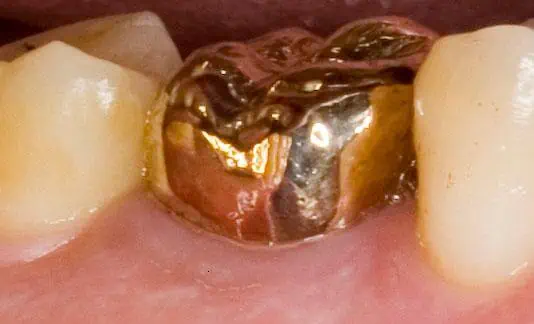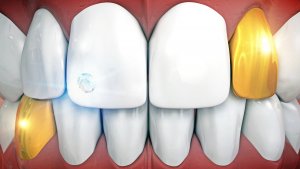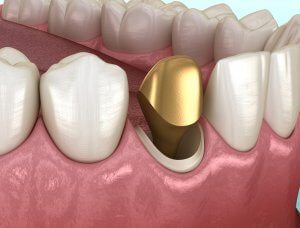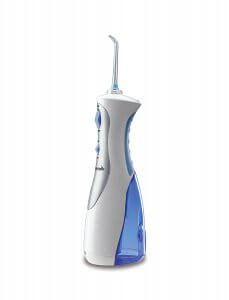What are permanent gold teeth, and why should you get them? Gold teeth come in a variety of forms, including implants, crowns, fillings, and grillz. They used to be much more common in restorative dentistry, but when used in Western society today, it’s more often for aesthetic reasons.
In this article, we will cover the following:
- Why you should get permanent gold teeth
- Types of permanent gold teeth
- Permanent gold teeth procedure
- Permanent gold teeth cost
- Permanent gold teeth risks
- DIY permanent gold teeth
- How to remove permanent gold teeth
Whatever your reasons for wanting to know more about gold teeth, read on as we discuss everything there is to know.
In This Article
Why permanent gold teeth?
- Gold is typically used in dental prosthodontics as fixed restorations( crowns) in removable partials and to build up severely broken-down teeth( post and core buildups) under esthetic crowns.
- Gold is durable as a restoration and can last up to 20+ years. Concerns may arise in certain technical preparations for crowns prior to cementation and should be avoided in long-span prosthetic bridges as galvanized gold is not strong enough to support these prosthetics.

Since gold is also extremely malleable while still mimicking the hardness of natural teeth, it’s the ideal candidate for a dental filling because it won’t damage the surrounding teeth. Gold is also nearly impossible to corrode.
While gold is still used to fill cavities, it isn’t as common as silver amalgam or composite. It’s much more likely that you will see gold teeth implanted on the jawbone of a celebrity than used to fill a hole left by a cavity.
If you want to find a dentist who offers gold teeth, you can call 866-383-0748. Live operators are standing by 24/7 to connect you to a dentist in your area.
Types of permanent gold teeth
Are there different types of gold teeth? Yes! Let’s have a look at them now:

- Gold grills: You probably know about grills for cars, but what are grills for teeth? Also known as ‘grillz’ or fronts,” these are decorative covers that snap over one or more teeth. These can be encrusted with jewels and precious metals and are generally removable. For more information, you can check out the following article on tooth decor.
- Gold tooth crown: Also known as tooth caps, some people will have their teeth fitted with gold crowns for a permanent golden fix. These are custom-fitted coverings to replace the natural crown of your tooth by using gold instead of another material.
- Gold braces: Though not exactly a tooth replacement, gold braces are a golden alternative to traditional braces.
- Gold tooth filling: Although this option isn’t very common nowadays, a gold tooth filling is still an option in modern dentistry. Most fillings are in places that aren’t visible when you smile normally, so the point of this is less aesthetic and more a personal preference.
- Gold tooth implant: These teeth are not 100% gold since gold is too soft to be used on its own as a tooth replacement. Gold teeth implants are usually 20-70% gold alloy; the only golden part is actually the crown. The metals usually mixed with gold for the alloy implant are copper, platinum, zinc, or silver. An implant will replace the root of your tooth with a metal screw, and a socket is put into the jawbone to hold it in place.
Permanent gold teeth procedure
Depending on what aforementioned option you choose to transform your smile into gold, the procedures vary in terms of time, recovery period, and price.
Gold teeth grillz
Removable gold teeth clips are referred to as grillz (grills). They are, by far, the most cost-effective and least invasive in terms of the procedure of a removable gold grill. It requires no surgery and very little fitting, and most sets can be bought pre-made.
Basically, a removable grill is a teeth-shaped flat piece of metal that bends underneath your front teeth and has a silicon insert to press up against the natural teeth while it’s in your mouth. You can order a set of fake gold grills online for next to nothing or you can spend $10,000 on an insane jewel-encrusted 24-carat set.
Gold tooth crowns
As previously mentioned, some people may opt for a more permanent grill by capping their front teeth with gold crowns. A gold-capped tooth requires a more invasive procedure:
- First, the dentist will shave away at the natural tooth crowns to make room for the new gold crowns to fit over the old tooth like a glove. You will leave the first appointment with a temporary crown that likely will not be as comfortable as your final piece.
- Next, the dentist will need to make an impression of the remaining tooth; these impressions will be used to make the new gold crowns.
- For the next appointment, your dentist will remove the temporary crowns and use dental cement to attach the new gold crowns.

Gold teeth crowns are also designed with jewels and other precious metals. Many people choose to include diamonds and other gemstones on the front-facing side of their crowns.
Gold caps usually cost anywhere from $800 to $2,500 per tooth; depending on how expensive the materials are and where you have them done.
Gold fillings
Fillings typically replace decayed parts of the natural tooth by first drilling out the dead parts and then putting gold into the remaining space.
Gold filling was much more common in the past but is now almost obsolete as composite fillings are virtually invisible, and silver amalgam is more cost-effective and durable. Whereas a silver amalgam filling costs between $50 to $150, a gold filling can cost up to ten times that price!
Here is a video that explains whether you should get a gold filling or crown:
Gold teeth implants
You can have an implanted grill as well. This is the most invasive option for permanent gold teeth. It requires surgery and is very costly.
The most common type of implant is known as an endosteal implant, which is surgically placed into the jawbone. The other, less common type is a subperiosteal implant, which involves a frame fitted onto the jawbone just below the gums.
Gold implants are not made of pure gold. This permanent option is usually made from a gold alloy. A gold alloy is made by mixing gold with another substance, like copper, platinum, or silver, in order to harden the material.
The procedure for implanting permanent gold teeth involves the following steps.
- First, the natural teeth and roots to be replaced with gold teeth need to be removed entirely. This is a surgery that requires a longer healing time and local anesthetic.
- After the natural teeth have been removed, the doctor will need to make an incision in the gums to expose the bone and then drill into the jawbone to set the implants. Sometimes this can be done on the same day as tooth removal, especially if there is no decay.
- Once the holes for the implants have been drilled, the abutments can be set. Think of this as the peg to which the tooth will be attached. Your doctor will likely give you temporary crowns to wear while the surgical site heals.
- After the abutments have been set and healed, the doctor can then place the permanent gold teeth crown on the abutment and screw it in or cement it with dental cement.

When it comes to gold teeth, implants are definitely the most permanent option. Implants can be removed, but it is a difficult and expensive process when compared to a removable grill.
This option is not recommended unless you already need to get unhealthy teeth replaced with implants. You should never have healthy teeth extracted if it can be avoided.
The only exception is if your teeth are too crowded and require more space for orthodontic treatment.
Permanent gold teeth cost
Time for the real question—how much is a gold tooth? Obviously, permanent gold teeth prices are higher than some other tooth materials, given the precious nature of the element.
You may see cheap offers around, but be wary if it seems too good to be true. A low cost might mean lower quality service and materials. Let’s compare the options available from your local accredited dentist.
Type | Gold grillz | Gold crowns | Gold implants |
Price | Depends on style and materials. Anywhere from $100-$500 for a basic set and potentially millions for a decked out grill. | $800-$2,500 per tooth | $2,700-$5,000, but it really depends on style and the amount of gold in each tooth. |
Pain | None (if yours is, you should remove it immediately). The more custom the set, the more comfortable it will be, but as they are a removable option, they are not painful. | Minimal, thanks to anesthetic | Some soreness and a longer recovery; can be lessened with anesthetics and painkillers |
Lifespan | With proper care, a lifetime. | On average 15 years, but with proper care up to 30 years | Up to 30 years |
Ability to change | Extremely easy. | Requires a dentist visit, but relatively painless. | The implant will always be there, but changing the crown is the same as changing a crown over a natural tooth |
Permanent gold teeth can be adorned with jewels and even diamonds, and you can expect the cost to rise accordingly.
The best way to check gold teeth prices for the procedure you want is to have a consultation with a dentist near you who offers gold teeth fillings or crowns.
Pay for gold teeth with a dental loan
If you’re looking for help paying for gold teeth, have a look at our guide to dental loans and dental financing to find the best solution for you.
If you can’t get dental insurance to cover your gold teeth and you can’t afford to pay for them on your own, a dental loan can give you the money you need to pay upfront for your treatment. You then pay back the entirety of the dental loan (plus interest) over installments.
You can use the SuperMoney loan search engine to search and compare dental loans.
Permanent gold teeth risks
When Florida rapper Kodak Black removed his permanent gold teeth (a permanent grill, not implants), he discovered he had gum disease.
So, it’s clear that there are some risks when it comes to dressing your teeth gold, including:
- Damage to healthy tooth structure
- Periodontal concerns
- Food impaction and development of carious lesions
- Occlusional shifting
- TMJ
And crowns can lead to tooth decay on the natural tooth if your gums begin to recede. Additionally, food and other debris can get stuck under your grill, creating a place for harmful bacteria to spread.
All grills come with risks, except implanted gold teeth, which would carry the same risks as normal implants, and are the preferred way to replace missing teeth. By limiting the amount of time spent wearing a removable gold grill, you can reduce the chances of tooth decay and gum disease.
How to care for permanent gold teeth
Caring for gold teeth is slightly more complex than caring for natural teeth. The most important thing to remember is to keep the spaces between the gold face and your natural teeth clean and free of debris. Here’s how to care for each type of gold teeth specifically:

A cordless water flosser can help keep permanent gold implants clean
- Gold grillz: The most important thing to remember when wearing your grill is to remove it from your mouth before eating. Food can become trapped between your teeth and the grill and cause decay. Try to limit the amount of time spent wearing the device, and make sure to thoroughly cleanse your teeth and grill before putting it back into your mouth.
- Crowns: Make sure to brush and floss twice a day and watch what you eat. A crown is more likely to be damaged if you eat hard or sticky foods. Try to avoid nuts, hard candies, crunchy foods, and chewing gum. Because gold doesn’t shrink, there is minimal risk of tooth decay around the edges of your crown.
- Implants: Gold alloy is known to turn black and become dirty over time. So, just like any golden jewelry, they need to be cleaned regularly. Caring for permanent implants is a bit more intense. It is important to use a soft-bristle brush and a non-abrasive toothpaste so as to not damage the tooth. Using a water flosser would also be a good idea to prevent any gum disease from beginning under the crown around the abutment. Read about the best water flossers.
DIY permanent gold teeth
DIY options should be avoided as they are always dangerous and can cause a great deal of damage. Some people will try to attach removable grills with glue to affix them to the natural teeth permanently.
This can lead to decay, damage, and discoloration of the natural teeth and is extremely inadvisable. If you have a grill, you should make sure that it can be easily removed so that you can properly care for your natural teeth.
Removing permanent gold teeth
Permanent gold teeth are usually taken out through a dental procedure done by a qualified dentist or oral surgeon. They are usually glued or cemented to the natural teeth. If you try to take them out without professional help, you could damage or lose the teeth underneath.
Removable options are more versatile since you can just take them out whenever you want normal teeth. Permanent gold teeth are trickier. Removing your permanent bling will require the expertise of your dentist. In order to not damage the abutment and remove the gold crown, the adhesive will need to be dissolved and the cap will need to be replaced with another permanent option. Nobody should try to remove a gold crown by themselves.
Conclusion
Gold teeth have become more prominent in pop culture over the past few decades. Grills are typically removable and come with significant health risks but cost a lot less than implants.
Implanted gold teeth are a more permanent option and are sported by some celebrities—with a cost to match. Consider your budget, your desired aesthetics, and how permanent you want your gold look to be when making your choice.
If you still have questions but you’re not ready to meet with a dentist in person, you can consult with a dentist online using teledentistry services.
FAQs
How much are gold teeth?
The permanent gold teeth cost ranges from a few hundred to a few thousand dollars. A single gold tooth cap can cost a thousand dollars and a whole set of implants can cost $2,700 to $5,000. You can call 866-383-0748 to discuss prices with a dentist near you.
Do permanent gold teeth rot your teeth?
The gold itself won’t rot your teeth. However, wearing a grill for too long and not maintaining proper hygiene will lead to faster tooth decay. Sometimes, gums will recede around the site of a crown. This could cause decay at the base of the natural tooth.
Can you get gold teeth removed?
Yes, crowns and implants can be removed and replaced with composite, porcelain, or other materials; the procedure isn’t so invasive but it requires a trip to the dentist.
Does getting gold teeth hurt?
Neither grills nor caps should cause pain or discomfort. Getting an implant in your jawbone can come with some pain that can easily be treated with painkillers. Additionally, anesthetics are used during the implant process.
American Dental Association: Grills. Consulted May 13, 2020.
Mayo Clinic: Cavities/Tooth Decay. Accessed May 13, 2020.
Journals.lww.com: Tooth Adornments, Gems and Grillz. Consulted Jan 25 2024.




